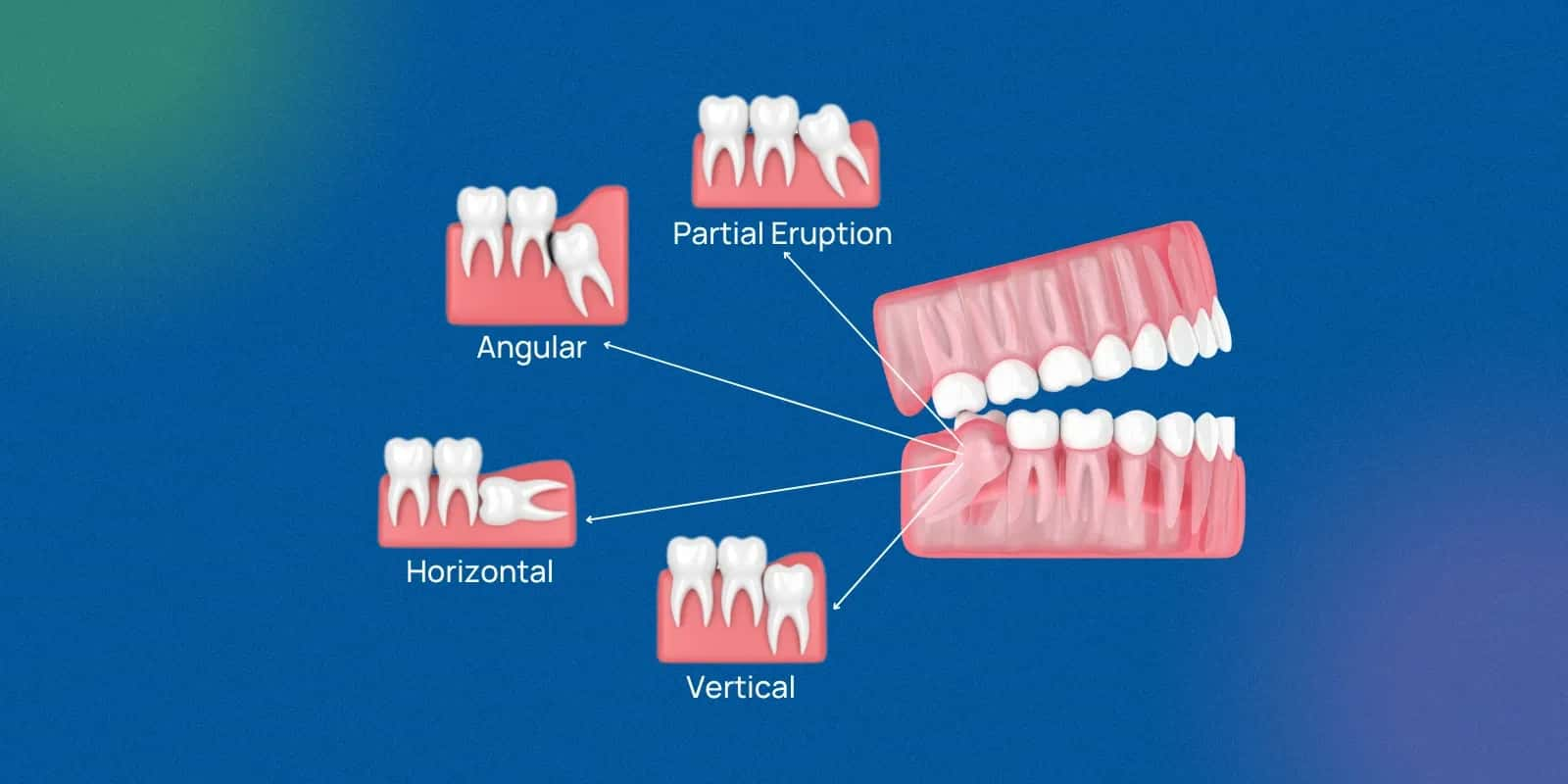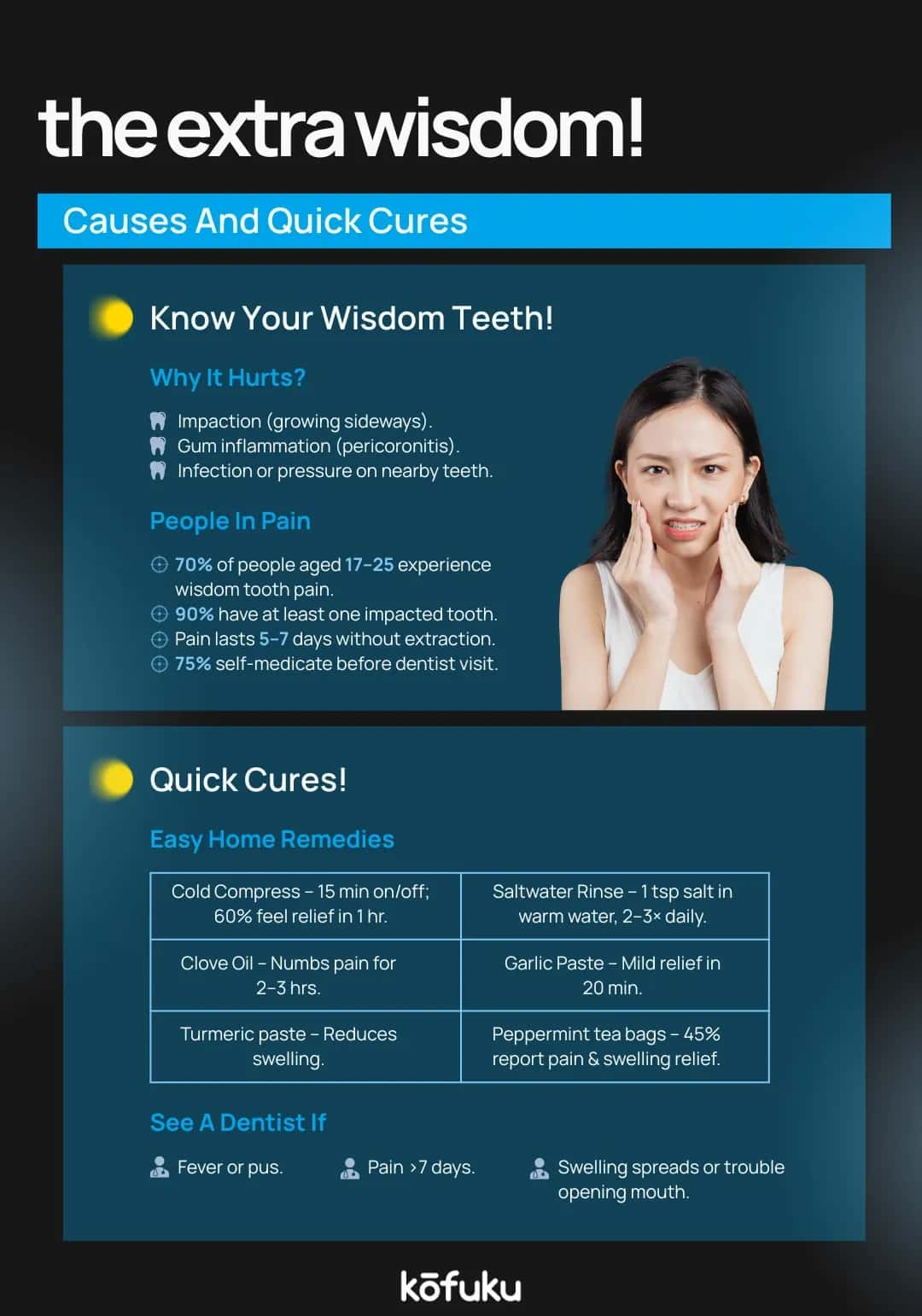Effective Remedies for Wisdom Teeth Pain: Home Treatments That Work


Introduction
Wisdom teeth pain is quite common, particularly when you’re in your late teens and early twenties, but that doesn’t make it any less awful. These molars that bloom late can cause sharp, throbbing pain, and even jaw stiffness.
The good news is that there are numerous basic home remedies you can try to reduce pain and inflammation, allowing you to feel better while you wait for dental treatment.
Why Does Wisdom Tooth Pain Come and Go?
You may have noticed that the pain you experience may not always be constant, and that's completely normal. This sporadic pain happens because:
-
Wisdom teeth get partially stuck under the gums and create temporary inflammation as they develop.
-
There is pressure in the gums or jaw, and this pressure decreases as the swelling goes down.
-
An infection or food lodged around the tooth may aggravate the symptoms and then subside gradually as it gets resolved.
How to Know if It’s Wisdom Tooth Pain or Something Else?
Confirming the cause helps determine treatment. Wisdom tooth pain symptoms present as:
-
Pain, or discomfort, right at the back of the jaw, where the third molars are emerging
-
Swollen and tender gums in that region.
-
Stiffness or discomfort opening the mouth.
-
Occasional headaches as a result of the upper molars pressing against your sinuses.
If none of these symptoms are present, the pain may be due to a cavity, gum disease, or a sinus headache, so pay attention. The best way to determine the cause is to visit a dentist.
Top Home Remedies for Wisdom Tooth Pain Relief
Tooth pain, regardless of the reason can be difficult to manage but not impossible. Listed below are some easy home remedies that can give you relief while you sort out the treatment aspects of it.
Salt Water Rinse
A warm saltwater rinse (1 tsp of salt in 240 ml of warm water) reduces bacterial buildup and irritation. Use this easy and effective method to alleviate some of that pain.
Clove Oil
Cloves have eugenol, which is known for its anaesthetic and anti-inflammatory properties. Dilute with carrier oil (1-3 drops of eugenol in 1 tsp of carrier oil) and apply with a cotton swab, 1-3 times daily.
Ice Pack
Alternate 15 to 20 minutes of cold (using ice or an ice pack) and warm pack. Cold will numb the pain, while warmth will relax the muscles that are causing pain.

Garlic Paste
Crushing garlic and exposing it to the air allows allicin to be released, which is an antibacterial. Leave the paste on your gum to temporarily reduce your pain.
Peppermint Tea Bags
Chill peppermint tea bags and place them on sore gums. Menthol is a mild numbing agent and also has antibacterial properties that will help with your wisdom teeth pain.
Turmeric Paste
Mix turmeric with water to create a paste. The anti-inflammatory and antibacterial properties of turmeric will help soothe pain similar to that of clove oil.
What Over-the-Counter Medicine Can Help?
You can also consider some medicines to help you manage wisdom tooth ache. Here are some options to consider:
Ibuprofen and Paracetamol: Which is Better for a Toothache?
Ibuprofen (NSAID) decreases inflammation and pain, whereas paracetamol is more of a general pain and fever reliever. Many experts suggest alternating between ibuprofen and paracetamol for the best pain relief. However, you have to cautious and consult your doctor if the pain persists.
Oral Gels: Temporary Pain Relief for Wisdom Teeth
Topical benzocaine gels, such as Orajel, can numb the gums; however, they may have side effects and are not intended for long-term use.
When should you see a dentist for Wisdom Tooth Pain?
You should seek emergency care or dental treatment if you have:
-
Severe pain that is relentless and not going away
-
Swelling around the eye, neck, or jaw
-
Fever and difficulty swallowing
-
Difficulty breathing or opening your mouth (trismus)
These symptoms might indicate infection or other complications that require treatment from a dental professional.

What Causes Wisdom Teeth Pain and How Long Does it Last?
Wisdom tooth pain is most usually caused by:
-
Eruption of a tooth through the gum tissue, which is painful but temporary
-
Impaction, where your teeth try to push through the gums or crowd others.
-
Infection from decay, which is a bit difficult to avoid because of its location in the back of the mouth, as it's deeper and harder to clean.
The duration of the pain ranges from a couple of weeks to several months. If impacted or infected, the only definitive long-term solution and your best bet could be to get the wisdom tooth removed. Consult with your dentist to know the right treatment for you.
Preventing Future Pain: Tips to Avoid Recurring Wisdom Tooth Issues
Here are some helpful tips to prevent any future wisdom tooth pain:
-
Maintain good oral hygiene by flossing next to your wisdom tooth every day.
-
Use warm saltwater or an antiseptic mouthwash as often as possible to help prevent infection.
-
Avoid hard, sticky, or crunchy foods if you have wisdom teeth pain. The less time these irritants spend near flare-up areas, the better.
-
Book routine dental check-ups to track the growth of your problematic wisdom tooth.
Wisdom Tooth Removal: Is It the Only Long-Term Cure?
Yes, if your wisdom teeth are severely impacted, causing recurrent pain or infection, then you may have to get them extracted as soon as possible. This will alleviate the pain and curb recurring problems. Even if your wisdom teeth are otherwise healthy, you can get them removed to avoid any pain or infections in the future.
When you are trying to manage your wisdom teeth pain, keep the following in mind:
Conclusion
Wisdom tooth pain can be intense, but you don’t have to power through it. A combination of warm saltwater rinses, cold packs, clove oil, and safe over-the-counter medications can temporarily alleviate some of your pain and inflammation.
If the pain, swelling, or infection persists, you need to see a dentist right away. Either way, practising excellent oral hygiene and visiting the dentist regularly will ensure your teeth are always healthy.

FAQs
Q. What are the best home remedies for wisdom tooth pain?
A. A saltwater rinse, cold compress, turmeric and clove oil paste, garlic, and peppermint tea bag are some effective remedies that you can practice at home.
Q. How to relieve pain in wisdom teeth naturally without medicine?
A. You can temporarily relieve your pain by doing a Saltwater rinse, using a turmeric paste, applying ice packs, garlic paste, clove oil, and peppermint tea bags.
Q. What tablet is best for wisdom teeth pain?
A. Ibuprofen (an anti-inflammatory) or paracetamol (an analgesic) will help relieve pain and swelling.
Q. Why does my wisdom tooth pain come and go?
A. The pain depends on the swelling or infection, so when the swelling goes down, so does the pain.
Q. Can I use clove oil for wisdom tooth pain?
A. Yes, 1 to 3 drops of clove oil diluted with a carrier oil, applied to the gums 3 times daily, provides relief.
Q. When should I go to the dentist for wisdom tooth pain?
A. You should see your dentist if the pain or swelling doesn’t go away, if you have difficulty breathing, swallowing, or a high fever.

Can Managing Emotions Help Us Control Chronic Pain? A Deeper Dive

Understanding Chronic Pain: Causes, Effects, and Solutions

What Causes Back Pain and How a Daily Walk Can Reduce Your Risk

